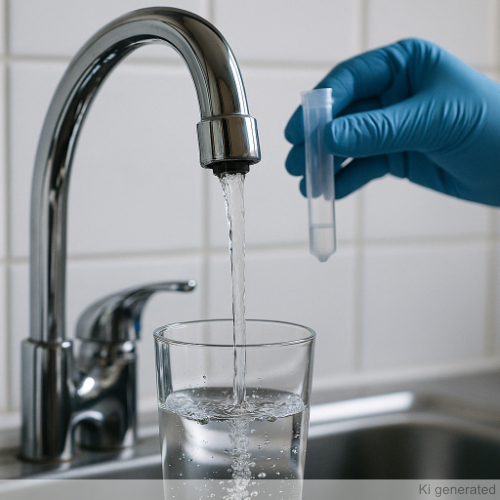- Water tests
- Air and pollutants analysis
- Mold analyses
- Asbestos analyses
- Rapid tests
-
Knowledge
- Further news
- Analysis made easy
- Tap and drinking water in Switzerland
- Facts about Indoor Air
- Facts about Mold
- Facts about Asbestos
-
Water quality in Switzerland
- Water Scarcity and Water Quality
- Drinking Water in Switzerland
- Tap Water in Switzerland: Quality and Controls
- Drinking Fountains in Switzerland
- Water Quality - Canton Basel
- Water Quality - Canton Bern
- Water Quality - Canton Geneva
- Water Quality - Canton Zurich
- NEWS: Zurich Drinking Water Map
- Drinking Water - City of St. Gallen
- Water Quality - City of Baden
- Water Quality - City of Bern
- Water Quality - City of Zurich
- Water Analysis - City Lucerne
- Water Quality - City of Winterthur
- The Water Supply of the City of Thun
- Initiative for Clean Drinking Water
- Nature's Thirst Quenchers: Fountains and Springs on Your Hike
- Partnership with WATER FOR WATER (WfW)
- Help & Services

Tap Water in Switzerland: Quality and Controls
Tap water is one of the most controlled foodstuffs in Switzerland. Nevertheless, it repeatedly comes under fire – most recently, for instance, due to the pesticide chlorothalonil. This was classified by the Federal Food Safety and Veterinary Office (BLV) as "probably carcinogenic" – but only after it had already been detected in groundwater. Such cases show that new risks can emerge – but the controls are comprehensive and reliable.
Overall, it can be said: Swiss tap water can be drunk without hesitation. The quality standards and monitoring measures are exemplary internationally.
Which regulations apply to Swiss tap water?
Drinking water is a natural product. Its composition largely depends on the origin of the raw water – which is why particular attention is paid to the protection of groundwater and surface waters.
Switzerland adheres to national regulations but also follows EU guidelines. The basis includes:
Implementation is carried out by cantonal water suppliers, who must maintain a quality assurance system.
Which minerals does tap water contain?
Tap water contains valuable natural minerals – they support the body and come directly from the source:
- Calcium
- Magnesium
- Sodium
- Potassium
- Iron
- Manganese
- Chlorite
- Sulfate
- Carbonate
Which pollutants can be contained?
Trace substances in tap water are normal – even mineral water is not free of them. In very low concentrations, they are not harmful to health:
- Metals (e.g., lead, copper, nickel)
- Germs (e.g., E. coli, enterococci)
- Nitrate and Nitrite
- Pesticide residues
- Drug residues
- Microplastics
Thanks to modern measurement technology and regular analyses, concentrations remain below the applicable limit values.
Limit values for tap water in Switzerland
- Aluminum: 0.2 mg/L
- Ammonium: 0.5 mg/L
- Lead: 0.01 mg/L
- Cadmium: 0.005 mg/L
- Chromium: 0.05 mg/L
- Enterococci: 0 mg/L
- E. coli: 0 mg/L
- Copper: 2 mg/L
- Nickel: 0.02 mg/L
- Nitrate: 50 mg/L
How is water quality ensured?
Over 2,500 water suppliers deliver to households. Modern laboratories analyze the water down to the nanogram range – allowing even tiny residues to be detected.
✪ The detection limit has been lowered – not the quality. What used to remain undetected is now visible – and can be treated more precisely.
In exceptional cases – such as floods or algal blooms – temporary problems may occur. In such cases, suppliers inform the public promptly.
Tip: If you want to be on the safe side, you can have a water analysis carried out for your own household. This allows you to detect possible heavy metal contamination or pipe problems early on.
✔ Heavy metals and pollutants
✔ For general drinking water, softeners
✔ Heavy metals and contaminants
✔ Separate bacteria test recommended
✔ Heavy metals and contaminants
✔ Separate bacteria test recommended
✔ Most common contaminants
✔ Bacteria analysis available separately
✔ 12 common pharmaceuticals
✔ e.g., diclofenac, ibuprofen
✔ Most common pesticides
✔ Glyphosate separate analysis
✔ Commonly used pesticide
✔ Possibly carcinogenic
✔ 20 common PFAS chemicals
✔ Per- and polyfluorinated alkyl substances
✔ 100 Test strips
✔ For general drinking water, water softeners









